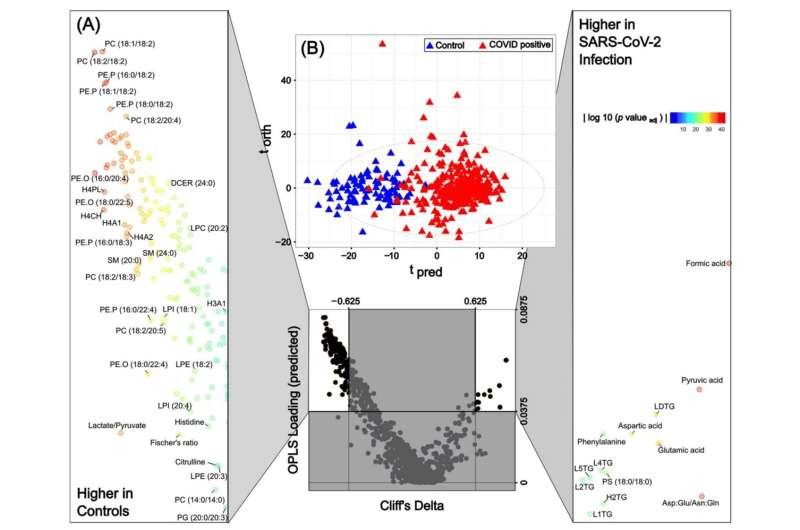This article has been reviewed according to Science X's editorial process and policies. Editors have highlighted the following attributes while ensuring the content's credibility:
fact-checked
trusted source
proofread
New markers could help predict how severely individuals will react to COVID-19

A multinational collaboration led by Professors Jeremy Nicholson and Julien Wist of the Australian National Phenome Center has revealed the key biological indicators that predict when a person will have a severe reaction to a disease, even predicting death.
The markers, discovered as part of a major global study of COVID-19 health outcomes, are relevant to the current pandemic and other respiratory viruses and diseases as well.
The research program followed 215 COVID-19 patients for up to a year post-infection. Scientists measured a range of immune system cells and metabolic parameters in blood plasma to assess how different people experienced the disease. The findings are published in the International Journal of Molecular Sciences.
The aim of this study was to comprehensively map the metabolic signature of each group of patients, classed by severity, to determine if a patient with COVID-19 who experiences mild symptoms is metabolically distinct from a patient with severe symptoms.
Professor Nicholson, Pro-Vice Chancellor for Health Sciences and Director of the ANPC, said the metabolic indicators of severe disease were unique to those that predict death.
"COVID-19 is one of the most complex systemic diseases that we have ever studied and it keeps throwing up new surprises," Professor Nicholson said.
"Importantly, there are many connections between the systemic effects of COVID-19 and other major diseases and so we are learning a lot from studying both the acute and long-term effects of the virus that will help us with other viral diseases.
"Interestingly, the markers for disease severity are not the ones that predict an individual's later death and this explains more about the mechanisms of the disease that will be relevant for the study of other viral diseases.
"That is actually rather surprising, especially as the mortality outcome appears to be determined very early in unvaccinated patients and is marked by a separate biological process to severity," Professor Nicholson said.
"So, you may get very sick from a respiratory viewpoint, but might also be highly unlikely to die from the disease, and that's a potentially helpful distinction for clinicians to make when deciding on the course of care for patients early in their disease."
Professor Wist, Deputy Director of the ANPC, said the long-term consequences of the disease are poorly understood and our ability to develop effective therapeutic management strategies relies on improving our understanding of the pathway the disease takes through our body.
"Being able to anticipate that pathway and how each patient will respond is really important to managing the disease—and also other diseases that we anticipate this new science is applicable to."
The research found that the severity of the disease is related to respiratory and confirmed systemic multi-organ involvement, so that affects a variety of pathways throughout the body, but also that each sub-group had distinct features.
This provides the basic science for developing more accurate diagnostic tools for more effective clinical management of COVID-19 patients. The team will now verify that these findings can be applied to other diseases to more quickly assess how patients will react and, ultimately, improve care as a result.
More information: Samantha Lodge et al, Integrative Plasma Metabolic and Lipidomic Modelling of SARS-CoV-2 Infection in Relation to Clinical Severity and Early Mortality Prediction, International Journal of Molecular Sciences (2023). DOI: 10.3390/ijms241411614

















